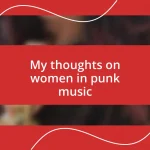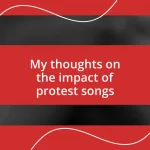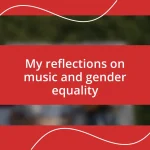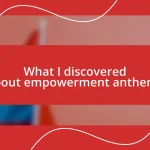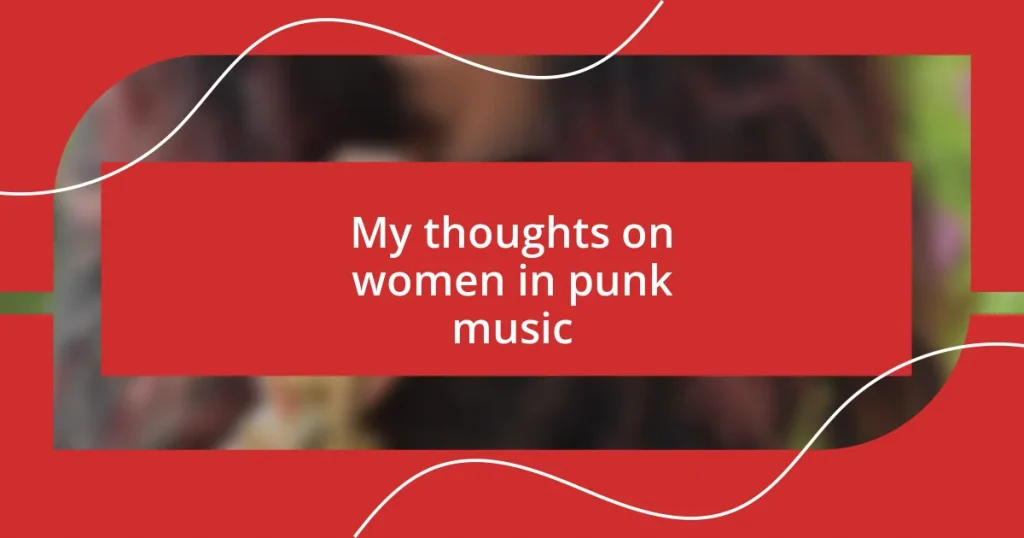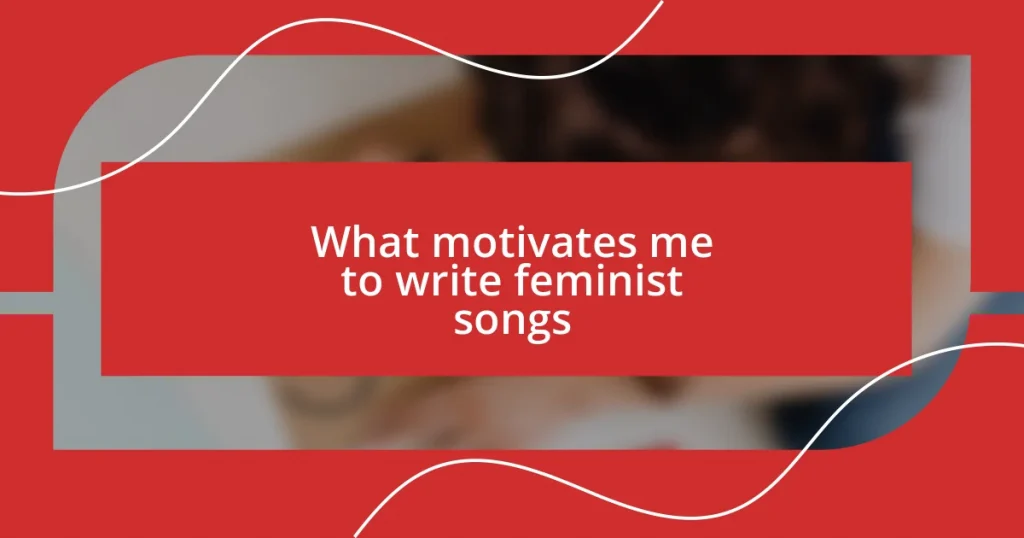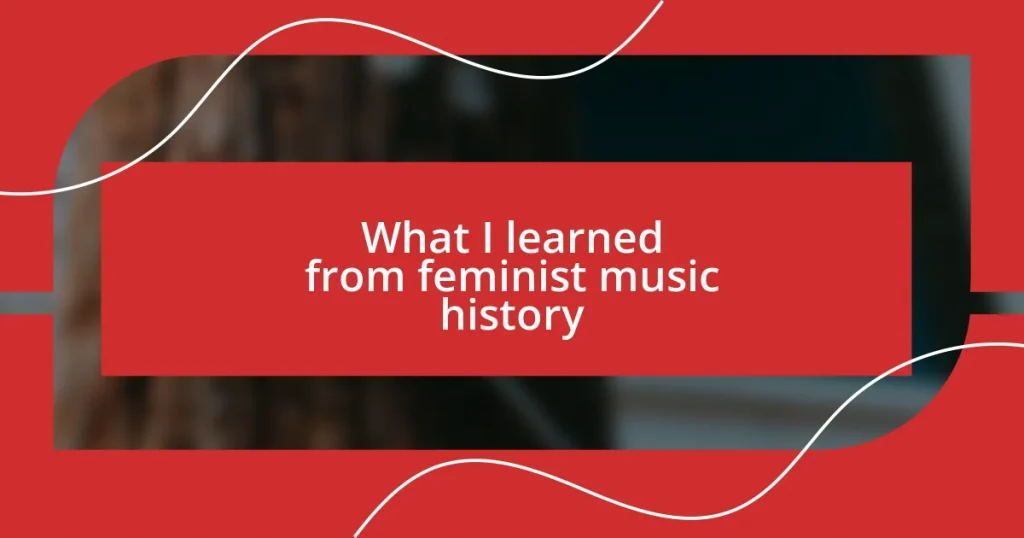Key takeaways:
- Women have historically reshaped punk music, with influential figures like Debbie Harry and Joan Jett paving the way for female empowerment and creativity within a male-dominated genre.
- The Riot Grrrl movement of the 1990s highlighted feminist themes, inspiring modern artists to address societal issues and promote personal narratives in their music.
- Despite the progress, challenges like sexism, lack of representation, and stereotypes persist, emphasizing the ongoing need for equality and recognition of women’s contributions in the punk scene.
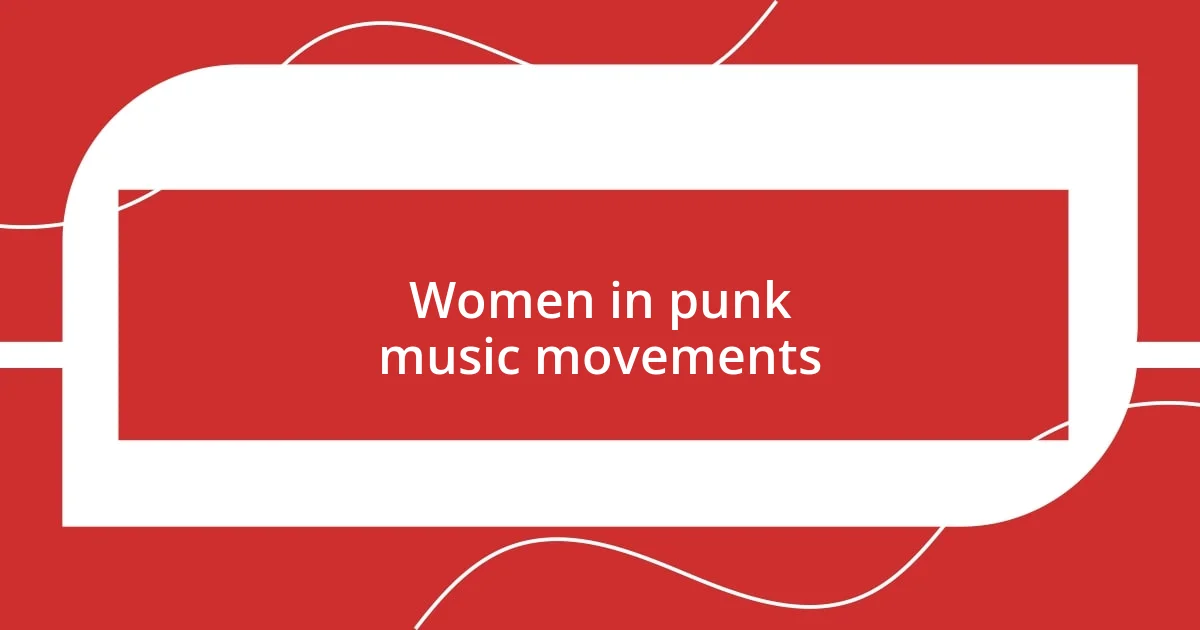
Women in punk music movements
Women have always played a crucial role in punk music movements, from the bold and brash style of Debbie Harry to the fierce energy of Joan Jett. I remember when I first discovered the music of the Riot Grrrl movement; it was eye-opening to see how these women used their voices to challenge societal norms. How amazing is it to see artists using punk as a platform for feminist expression, promoting empowerment and solidarity among women?
As I explored further, I realized that the contributions of women in punk aren’t just about the music; they reshape cultural narratives. Take bands like Sleater-Kinney, whose lyrics resonated with my own experiences of defiance and self-expression. It made me wonder, have you ever listened to a song that perfectly captured your thoughts? For me, that connection is what makes punk so powerful.
It’s inspiring to think about how women in punk continue to pave the way for future generations. I often reflect on how their struggles and triumphs resonate in the music we hear today. Each strum of a guitar or beat of a drum is permeated with the passion of those who dared to challenge the status quo. What does that say about the ongoing fight for equality in the music industry? It shows that punk is not just a genre; it’s a living testament to resilience and creativity.
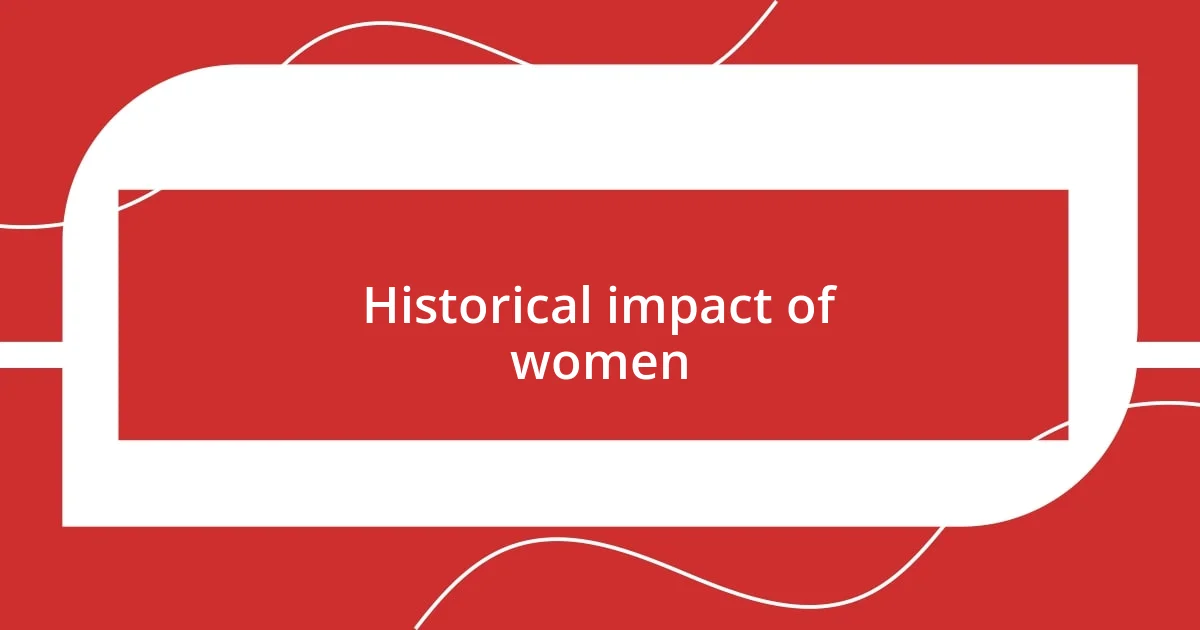
Historical impact of women
Women have significantly reshaped punk music’s landscape since its inception. I can’t help but think about how the raw sound of artists like Poly Styrene reflected a rebellion against conventional femininity. Their fearless approach set the stage for countless other female artists to express themselves and forge their own paths in a largely male-dominated scene.
When I look back at the 1970s and 80s, it’s clear how pivotal female punk musicians were in promoting change. Bands like The Slits and X-Ray Spex didn’t just create captivating music; they became symbols of empowerment for women everywhere. Their songs spoke volumes about identity and autonomy, empowering me during moments when I felt voiceless.
Moreover, the legacy of these trailblazing women continues to inspire modern female musicians. For instance, I’ve watched artists like Phoebe Bridgers credit their punk influences in interviews, showing how intertwined the past and present are in music. It’s remarkable to see how the groundwork laid by women in punk has led to an ongoing dialogue about gender and creativity in today’s music scene.
| Time Period | Impact of Women in Punk |
|---|---|
| 1970s-1980s | Women like Debbie Harry and Joan Jett challenged norms, setting a precedent for female empowerment in music. |
| 1990s | The Riot Grrrl movement emerged, promoting feminist themes and social consciousness through punk narratives. |
| 2000s-Present | Modern artists continue to draw inspiration from earlier female punk musicians, expanding punk’s legacy and relevance. |
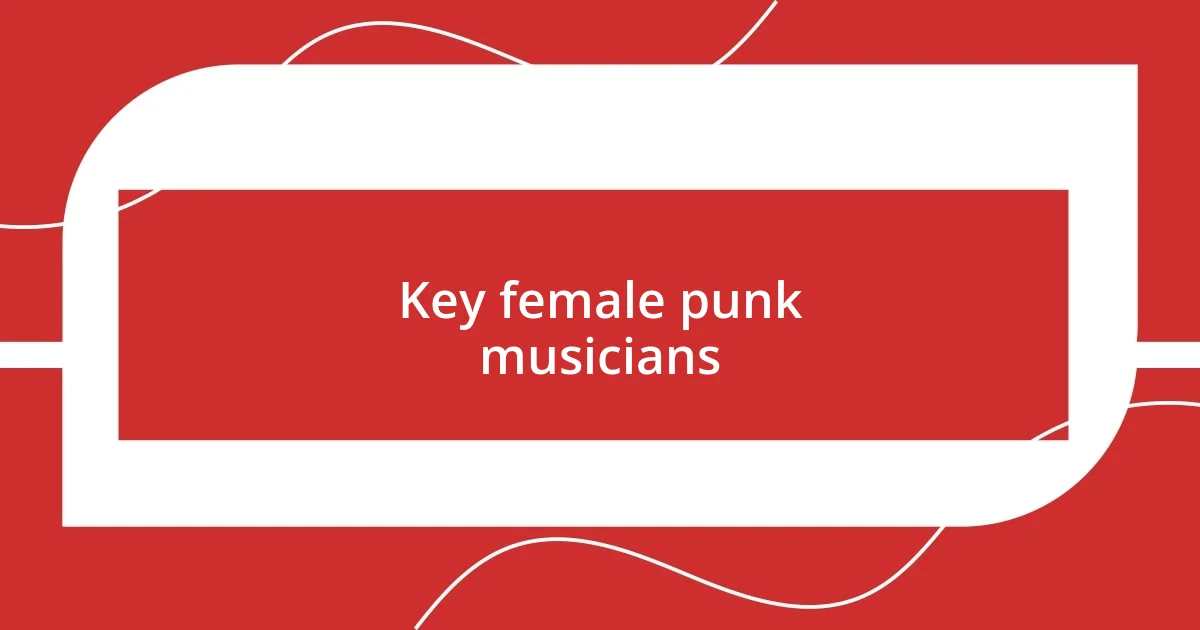
Key female punk musicians
It’s hard to truly appreciate the essence of punk without acknowledging its key female musicians. Artists like Debbie Harry, with her dynamic stage presence, didn’t just break barriers; she virtually exploded them. I still remember the first time I saw her perform. The energy and boldness she exuded left a lasting impression on me. Joan Jett was another game-changer; her anthem “Bad Reputation” became a personal rallying cry, reminding me to embrace individuality at all costs.
Here’s a look at some key female punk musicians who shaped the genre:
- Debbie Harry (Blondie) – A pioneering figure, blending punk with pop.
- Joan Jett (The Runaways, Joan Jett & The Blackhearts) – A fierce advocate for female empowerment in rock.
- Poly Styrene (X-Ray Spex) – Known for her punk ethos and distinctive vocals.
- Kathy Acker – Combined punk aesthetics with literary art, pushing boundaries in both fields.
- Bikini Kill (Riot Grrrl movement) – Challenged sexism in the scene, sparking a feminist punk revival.
- Sleater-Kinney – Their powerful lyrics about identity and activism still resonate today.
- Patti Smith – Incorporated poetic storytelling into punk music, redefining artistic expression.
Each of these musicians didn’t just contribute songs—they embodied a movement. I often find myself reflecting on the emotional weight their music carries, as it speaks to our experiences and struggles. It’s a potent reminder that punk’s roots are deeply entwined with the fight for gender equality and personal freedom.
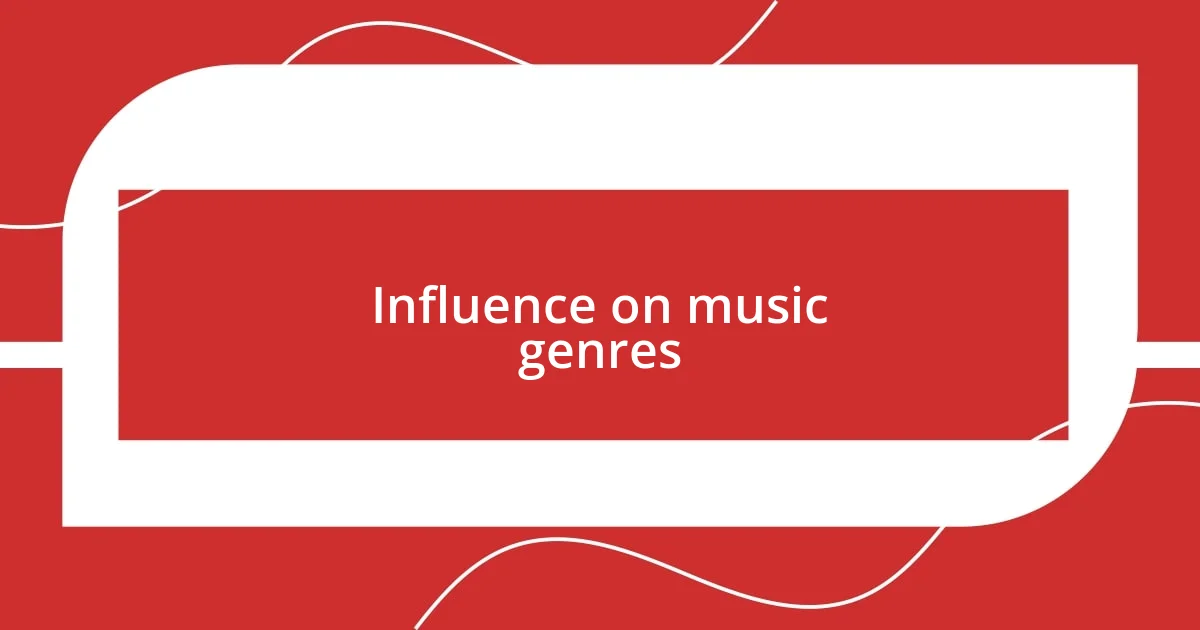
Influence on music genres
When considering the influence of women in punk music, I can’t help but marvel at the way they’ve impacted various genres. Take the Riot Grrrl movement of the 1990s, for instance. It didn’t just stay contained within punk; its ethos seeped into alternative rock, grunge, and even pop as women like Kathleen Hanna voiced their frustrations. Their unapologetic approach to addressing societal issues resonated with many, including myself, sparking discussions about feminism that reached far beyond the punk community.
It’s fascinating to see how female punk artists shaped the sounds of genres like pop and indie rock. For example, bands like Sleater-Kinney brought punk’s rawness to mainstream audiences, incorporating fierce guitar riffs and powerful lyrics that still inspire artists today. Listening to their music often reminds me of the times I felt empowered to stand up for myself, reflecting the strength that these musicians embodied. Have you ever listened to a song that totally transformed your perspective? That’s what these influences can do—expand horizons.
Moreover, the mixing of punk energy with other genres created a more inclusive musical landscape. When I hear modern artists blending punk elements with hip-hop or electronic sounds, I’m reminded that the legacy of women in punk continues to inspire innovation. It’s thrilling to think about where these artistic intersections will lead next and how many more doors they will open for future generations. Isn’t it exciting? I find it hard to believe we’re just scratching the surface of what’s possible with music and gender representation.
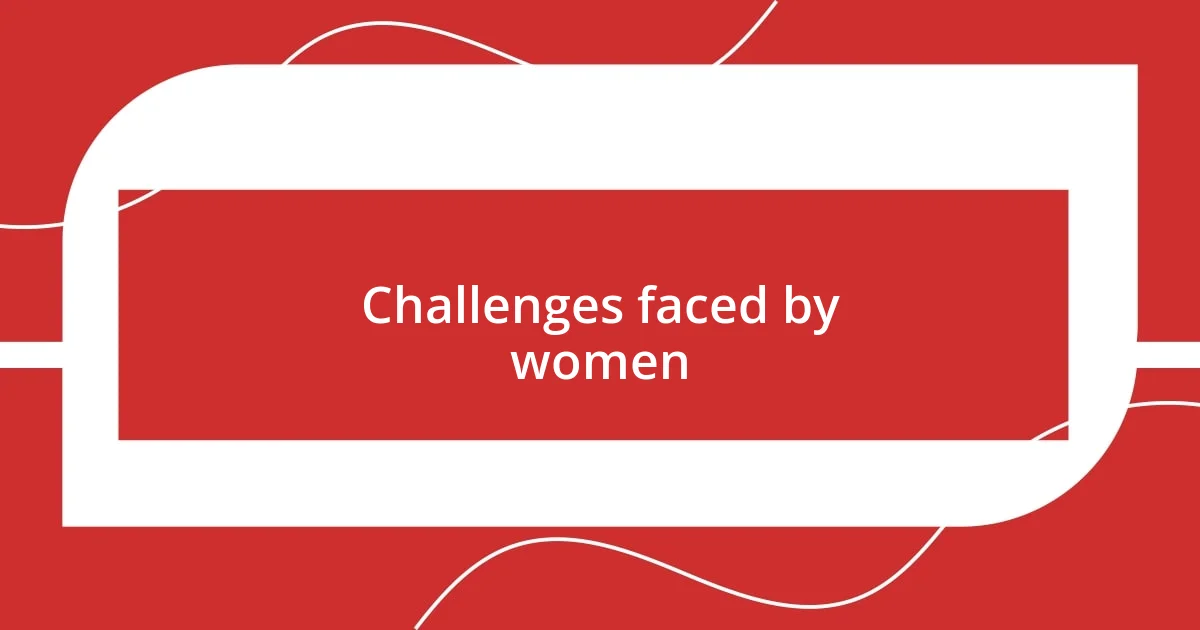
Challenges faced by women
In the punk scene, women have faced a myriad of challenges that often seem insurmountable. I recall a time at a small venue where the atmosphere was electric, but it quickly turned hostile towards the female performers. Watching a band I loved get heckled just for being women was a stark reminder of the sexism that can pervade even the most countercultural spaces. It leaves me wondering—why is it that in a genre so rooted in rebellion, women still struggle to be taken seriously?
Moreover, the lack of representation and visibility can be disheartening. It’s not uncommon to see lineups dominated by male musicians, with women often relegated to smaller stages or less prominent slots. I’ve felt the disappointment after arriving excited to see a female-led band, only to find out they were performing at a time when few would notice. This pattern perpetuates the idea that women’s contributions are somehow less worthy of recognition, and it makes me question how many talented artists go unnoticed because of systemic biases in the industry.
Another significant challenge is the pervasive stereotypes that women in punk must navigate. I remember meeting a female guitarist who expressed frustration about always being asked, “What’s it like being a woman in punk?” It’s a valid question, but it oversimplifies her identity as an artist and musician. Why can’t we appreciate women as creators in their own right, rather than just through the lens of their gender? These experiences highlight a need for a deeper conversation about equality in music—one that values the individual over traditional expectations.
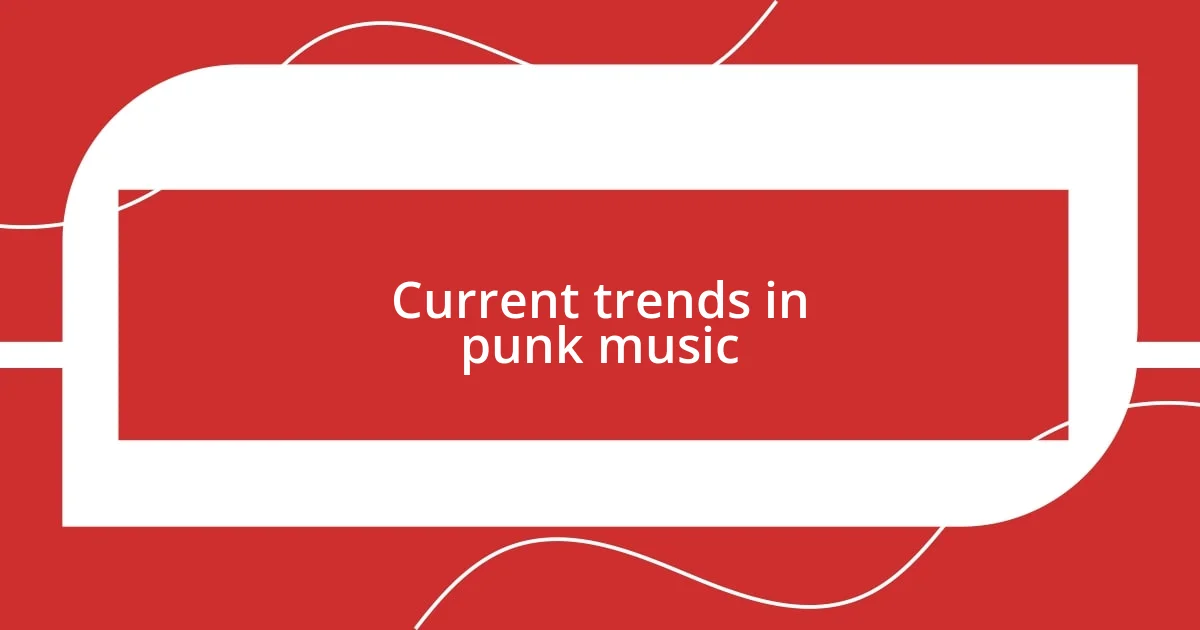
Current trends in punk music
Current trends in punk music reveal a remarkable shift, especially with the rise of diverse voices. I recently came across a new group fusing punk with indie pop in a way that made me reflect on my own musical tastes. These young women aren’t just picking up instruments; they’re rewriting the rules of what punk can sound like, imbued with commentary not just on societal issues but also on mental health and identity.
I often find myself drawn to the lyrical depth of newer bands. For example, one singer I recently discovered passionately sings about personal experiences that many can relate to, like navigating relationships and self-empowerment. It struck me because it brought back memories of my own struggles, reminding me that punk isn’t just about rebellion; it’s also a space for vulnerability. Wouldn’t you agree that music has this uncanny ability to connect us, especially when we hear our own stories reflected back at us?
Interestingly, the collaboration between punk and digital platforms has grown tremendously. I’ve noticed more artists using social media to showcase their music and connect with fans directly, breaking the traditional barriers of the music industry. It’s refreshing to see how these platforms have given rise to a new generation that embraces authenticity over commercial appeal. Don’t you think it’s amazing how technology can empower artists to be more than just performers? With each click, they’re building communities and redefining what it means to be part of the punk scene.
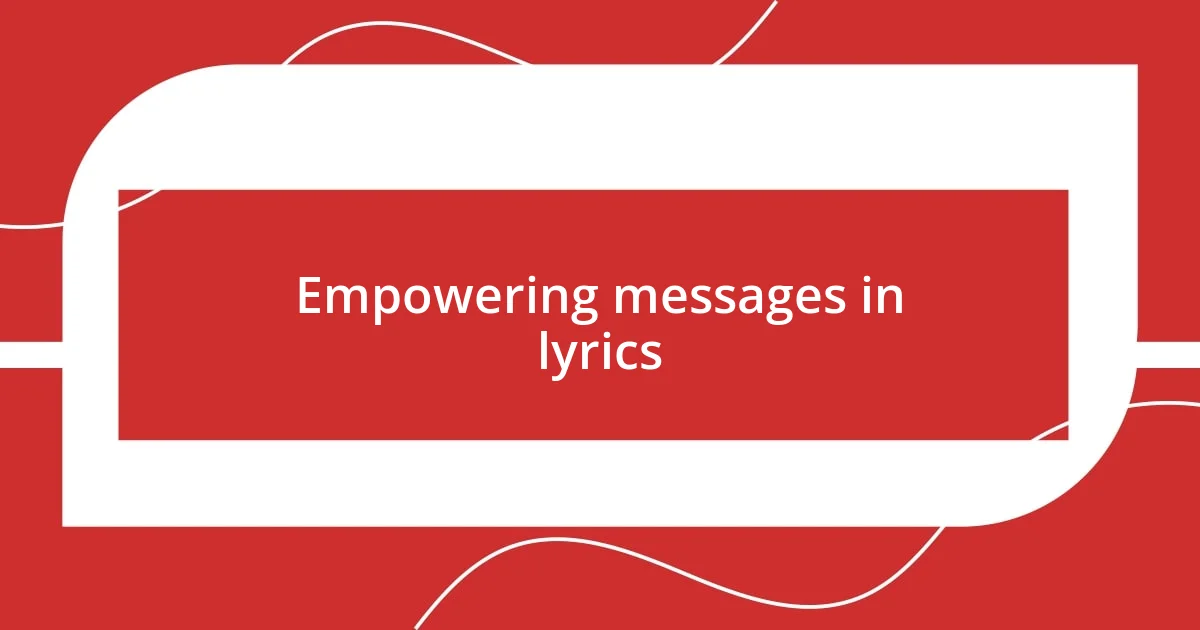
Empowering messages in lyrics
The empowering messages found in punk music lyrics are often a direct reflection of the artists’ personal struggles and triumphs. I still remember the first time I heard a female punk vocalist belt out lines about reclaiming her space and voice in a world that often tries to silence women. It was a powerful moment that resonated deeply with me, reminding me that music has the ability to not just entertain, but to uplift and inspire action. Isn’t it incredible how a few well-constructed lines can spark such a sense of empowerment?
Lyrics that boldly confront societal norms and celebrate individuality serve as a catalyst for change. Take for instance bands that challenge expectations of beauty and femininity in their songs—it feels like a rallying cry for anyone who’s ever felt marginalized. I once attended a show where the lead singer unapologetically critiqued the toxic ideas of perfection and self-doubt. It felt like a communal experience, sparking conversations among the audience about our own struggles with self-acceptance. Could anything be more energizing than finding common ground through shared experiences in music?
Moreover, the intersection of punk lyricism and personal empowerment is particularly striking in narratives of resilience. I often reflect on the lyrics of one particular song that tells the story of overcoming a toxic relationship—its blend of raw emotion and defiance left me with chills. The way these artists weave their stories not only gives courage to others in similar situations but reinforces the idea that we can make it through adversity. How many times have we found solace in music that understands us in our darkest moments? That’s the beauty of punk—it’s a genre that refuses to shy away from the complexities of life, offering both strength and solidarity to those who listen.


